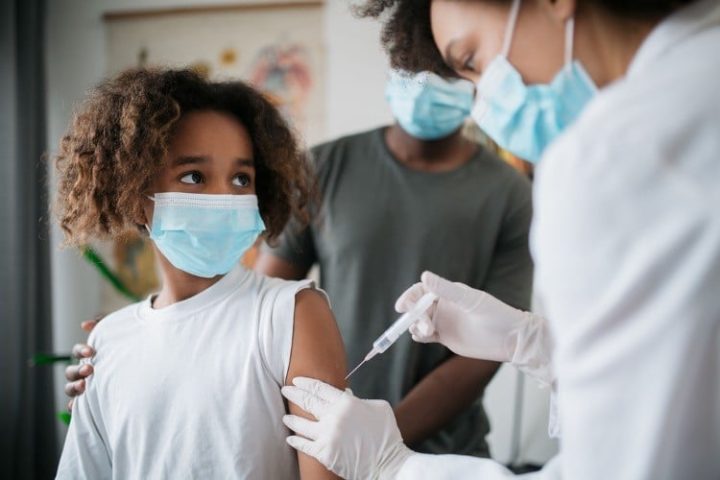
The Food and Drug Administration’s Vaccines and Related Biological Products Advisory Committee met on Tuesday to discuss Pfizer-BioNTech COVID-19 vaccine for children five through 11 years of age (full recording is available here).
While the committee endorsed the shot in a 17-0 vote, one FDA panelist, Dr. Eric Rubin, made some unsettling remarks in regard to vaccines’ safety, saying, verbatim, “We’re never gonna learn about how safe the vaccine is until we start giving it. That’s the way it goes.”
Dr. Rubin noted,
This is a much tougher one, I think, than we had expected coming into it. The data show that this vaccine works and it’s pretty safe.… And yet, we’re worried about a side effect that we can’t measure yet, but it’s probably real. And we see a benefit that isn’t the same as it is in older patients.
Dr. Rubin further stated:
It’s a very, sort of, personal choice. If I had a child who was a transplant recipient, I would really want to be able to use a vaccine. And there are certain kids who probably should be vaccinated. The question of how broadly to use I think is a substantial one. And I know it’s not a question, and I know we’re kind of punting that to ACIP [Advisory Committee on Immunization Practices of the CDC].
But I do think that it’s a relatively close call…. It really is going to be a question of what the prevailing conditions are. But we’re never going to learn about how safe this vaccine is unless we start giving it. That’s just the way it goes. That’s how we found out about rare complications of other vaccines like coronavirus vaccine. And I do think we should vote to approve it.
Dr. Rubin did not argue that the committee should issue a limited endorsement for the jab, and recommend it only to immunocompromised children or those having known co-morbidities to COVID, such as obesity or diabetes. While admitting that the benefits of vaccination for young children are not as great compared to those in older people, and that the long-term safety will only be learned after the vaccination begins, he still fully endorsed it.
The mainstream media was quick to try to sugar-coat Rubin’s statement.
Aaron Blake of the Washington Post wrote that Dr. Rubin’s comment was “significant and noteworthy,” but, at the same time, it was “basically tailor-made for vaccine skeptics such as Tucker Carlson and Sen. Ron Johnson (R-Wis.).”
The outlet “explained” that the parents should not worry, because they are not being “forced” to inoculate their children with experimental jab yet.
“What the FDA is considering here, after all, is not forcing any children ages 5 to 11 to take the vaccine; rather, it’s about giving parents the option,” the article reads. The parents must understand that in the situation of a “public health emergency … difficult decisions need to be made without the kind of extensive studies everyone would prefer were done.”
In other words, while the long-term side effects in children are not yet fully studied, and there is no knowledge of the “rare” side effects, the parents should “trust the science” and at this time decide for themselves weather they want their kids jabbed. Blake, while seemingly seeing no problem with the idea of forcing people to take a drug against their will, added that no “forcing” will even begin “until we get the more extensive data.”
This type of “reassurance” is troubling, since we have already seen that the FDA and the CDC are uninterested in analyzing its own data on possible side effects associated with COVID vaccines in adults. VAERS, an admittedly “passive” system that only reflects a “tiny fraction” of all adverse reactions, has already recorded some 16,310 deaths (with 5,326 of those deaths occurring within two days following the vaccination), and 778,685 total adverse events to COVID jabs, yet the top regulatory and health agencies continue to insist the vaccines are “safe.” Moreover, the Biden administration is employing increasingly coercive tactics to get people inoculated.
Dr. Rubin was not the only speaker who conveyed some troubling messages.
Dr. Fiona Havers of the CDC admitted there are no studies on the long-term outcomes of the vaccine in children (1:03:22), as there is not information available on the vaccinated children’s chances of reinfection (1:05:44).
Dr. Matthew Oster, a pediatric cardiologist, commenting on the data available on vaccinated adolescents, outlined the higher chances of young male vaccine recipients having higher chances of developing heart inflammation than their unvaccinated peers (1:11:26). In females, the risk of developing myocarditis following vaccination was lower than in males, yet still exceeded the “background incidence.” At the same time, the chances of adolescents developing myocarditis due to COVID were significantly lower compared to them developing the condition due to vaccination (1:20:13).
As of October 21, COVID-19 death rate in children ages 5-11 represented 0.03 percent of all COVID-19 deaths in the United States, 0.008 percent of total COVID-19 cases, and 0.0005 percent of deaths among the entire U.S. population. The age group of 0-17 years made up for 0.0000002 percent deaths by total COVID-19 cases, according to the CDC data that was presented during the discussion (4:43:49).
The safety data on the Pfizer shot for children, based on “at least two months of follow-ups,” showed, according to the FDA (2:20:01), that no recipients developed any of the “adverse events of special interest,” including myocarditis/pericarditis, anaphylaxis, Bell’s palsy, and appendicitis.




